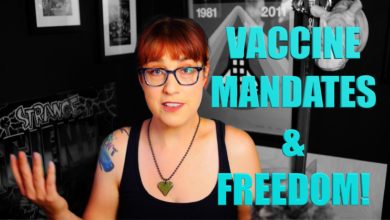Organic food: the debate goes on
Although pro-organic bodies are claiming there is a growing body of research which supports the notion that organic food is more nutritious and therefore healthier, the general scientific consensus at present is that it’s simply not.
Now, one of the UK’s leading nutrition experts, Lord Krebs (yes, really), has waded into the debate with a damning “look, stop being so silly, of course it’s not healthier” -type smackdown.
Good for him. I don’t say that because he’s right; he may yet turn out not to be although current evidence is largely in his favour. I say it because while the evidence does swing away from organic, I don’t like to see low-income families being put through the guilt wringer when it comes to their kids’ health. Any carrots are better than no carrots, organic or not, and that includes the cheap ones.
http://lifeandhealth.guardian.co.uk/food/story/0,,2269340,00.html





Well, I’d just like to say that I keep a completely organic diet, and I highly recommend it.
I eat nothing that is silicon based.
I’ve always wondered about this “organic” vs “not organic” food thing… since I’ve never found anything foodstuff that doesn’t contain hydro-carbon molecules.
What? You’ve never tried Gravel-o’s, the new improved cereal from China’s premier foodmaker “Chang Industries” of I-Can’t-Believe-It’s-Not-Plumbium fame?
I can’t believe you people, considering yourselves open-minded and never even trying non-organic produce.
What can I say? I’m just a carbon-based bigot.
Really? Lord Krebs said that?? Man sounds like he might be on his cycle!
The son of Hans Adolf Krebs, the German biochemist who described the uptake and release of energy in cells (the Krebs cycle), John Krebs was educated at the City of Oxford High School and Pembroke College, Oxford (BA 1966; MA 1970; DPhil 1970).
Cool. The Krebs Cycle :-D
I have had some really good tasting high quality organic food, but I certainly don;t think this necessarily equates to nutritious value. More likely it has to do with a much more general preference for food stores to take and sell goods that have been developed for shipping an not flavor. None of this has to do with nutrition though.
I’m just gobsmacked that the UK’s leading nutrition expert is not only named Krebs, but is a Krebs. Or one of the Krebs. Whatever.
Whichever side of the coin wins that particular debate, there remains the obvious outstanding question as to the effects of long-term ingestion of pesticides and growth hormones, not to mention all those fears of bee genocide, threats to biodiversity, etc. These strike me as far more important questions.
A couple of years ago, we did the organic box thing from the lovely people at Riverford Organics. I will happily, unscientifically attest that the stuff *tasted* way better than supermarket stuff, which I think is down to the *varieties* of veg that they grew. Rather than selecting for water content, they were chosen for pest resistance first and flavour second.
As the son of a greengrocer, I can confirm that they “tasted like things used to”.
And the point about nasties passing up the food chain is an excellent on.
My only quibble with the box scheme is kohl rhabi. What’s the point of that?
I could never understand the obsession with “organic” stuff. (in my county it is rather a debate of “natural or not natural” )
Simra: i would not be afraid of growth hormones, since they are polypeptides that are digested (namely by pepsin in your stomach), so thay are very unlikely to affect anyone. But correct me if i am wrong.
Soylent green is my favorite organic food. Recycling is good for the environment.
davehodg: that’s quite possible, although you can’t rule out a bit of bias on your part (organic doesn’t fare better in blinded taste tests). However, the really vital factor in taste is freshness, and that’s very likely what was going on in your organic box. Veg picked yesterday, organic or not, will taste better than veg picked six weeks ago, artificially ripened, flown across the world, packed, and sat on a supermarket display under the lights for a week.
Trouble is, no-one does the ‘fresh veg’ box that’s not organic! So you end up paying a premium. Well, that’s OK to get super-fresh veg, but in my opinion, if you’re, say, a single mother on benefits struggling to give her kids nutritious food on a very tight budget, like some of my friends, then the difference is not worth it.
Does anyone still plant vegetable gardens in their back yards anymore?
I agree with JakeL…. I think the designation “organic” is stupid.
That said, I don’t see how organic food can be more nutritious, especially since plants grown in this manner are often provided with fewer nutrients as it is growing. That said, I can see why people want to eat organically grown foods, but it has nothing to do with the actual nutritional value.
Yes, RavW, my whole back yard is a garden. We ripped out the grass and we grow all of our own produce in the summer, plus I preserve what I can for use in the winter. The stuff for the garden does taste better, and we grow it without the use of chemical fertilizers, pesticides, or herbicides. But the difference in flavor is, as davehodg, said, because of the varieties grown and because they are allowed to ripen naturally.
There’s also the point that here in America, the “factory farmer” lobbyists have been methodically subverting the government standards for “organic” foods.
I also grow my own (veg!), and I agree with Writerdd–it’s the ripening process that makes the difference in the taste.
Also, I don’t have to grow varieties that are chosen for long shelf life or mechanical harvesting.
I thought the point of organic food was that it is grown without using massive amounts of pesticides, which is why it’s considered healthier, not because it’s intrinsically more nutritious. And that it is more expensive because they don’tuse the chemicals “normal” farmers use allow them to grow high quantities of pesticide laden produce. In other words, it’s the cost of old school farming.
the only “organic” product i buy routinely is milk, mostly because it just flat out tastes a lot better.
also, my uncle is a dairy farmer, and after switching to “organic” farming about 5 years ago, he says his cows are much healthier and actually get sick less frequently.
my parents live on 8 acres in the country, and they have 2 gigantic gardens, so i get fresh veg all summer long and frozen or canned ones for the winter. it’s great, and the tomatoes…oh, the tomatoes…
Actually, the cost of organics is higher, usually, because the alternatives to pesticides usually are more labor intensive, and have a smaller market share (are more expensive).
@tkingdoll: citations for these taste tests please!
There may be some merit to the argument about use of pesticides; there is none with respect to the use of “chemical” fertilizers.
Plants only absorb nitrogen as either ammonia or as nitrate. Any “organic” fertilizer that supplies these can be no different than a non-organic fertilizer because the molecules that the plant takes up are exactly the same. All “organic” fertilizers have to be broken down by soil bacteria for the nutrients to become soluble so that the plants can take them up. There may be differences in rates of take up and rates of application, but those are independent of the source of the nutrient.
I prefer non-organic simply because I feel it has a lower environmental impact. To me, one of the most important environmental impacts is habitat loss for wild animals. Yields are lower on organic farms, so more wildlife habitat needs to be cleared to provide the same amount of food. More wildlife habitat cleared, less habitat for wild animals.
I see the opposition to all things GM as very unfortunate and for the most part based on ignorant nonsense. The only possible way that we are going to grow enough food for everyone and provide everyone with enough resources to live a decent life without turning the Earth into a wasteland is via GM techniques.
Thanks, bug_girl. That makes sense.
This goes right to the heart of the argument against organic food. I don’t think people realize the problems that would be caused if everyone actually made the switch.
My husband works for a local dairy farm. They’re not organic, but they don’t use hormones and they only use antibiotics if a cow is actually sick, at which time they remove the sick cow from the line so the milk is not used.
I am not sure the ‘organic’ part is what makes the milk taste better. My husband’s dairy has milk that tastes better too. First, the milk gets to the customers within 24 hours of being removed from the cow. Second, they don’t add water to the milk. Yes, most milk producers do add water. That’s what makes the skim milk look blue. The skim milk from Longmont Dairy is white, even though it has the low fat content that is required for the nonfat designation.
The feed given to the cows could change the taste of the milk as well, although I think it would be less important whether or not the feed is organic, and more important just what is fed to the cows.
I buy a lot of locally-produced food – fruit, veggies, and meats – and sometimes it’s organic, sometimes it’s not. I agree with the commenters who mention that organic foods generally taste better, but it’s not necessarily because it’s “organic.”
I personally don’t have issues with GM food, or the idea of cloned meat. If we want to get food to the people who need it (and we should want that), those paths are some of the best options.
Tkingdoll, I think you have a good point about the guilt trips about organic food. When my daughter was born, I was a struggling single mother, and I know that finding cheap, good food is not an easy trick. You don’t need misinformation like this on top of it.
daedalus2u: on the one hand you argue against organics on the basis of their environmental impact and on the other you insist GM plants are perfectly safe- but surely the jury is out on the impact GM plants (not to mention industrial-scale monoculture farming) have on biodiversity. The attitude that scientific authority knows best has proven disastrous in the past (think Australia + rabbits) and it seems to me that it’s only a matter of time before we inadvertently engineer a rampantly invasive species (the only real hedge against this seems to be Monsanto’s preference for producing sterile plants).
GM is not a panacea for solving world hunger- the main problems we have with feeding people are socioeconomic in nature and no amount of miracle rice will solve them.
First, Merriam-Webster online defines organic as:
“of, relating to, yielding, or involving the use of food produced with the use of feed or fertilizer of plant or animal origin without employment of chemically formulated fertilizers, growth stimulants, antibiotics, or pesticides ” so it is a real word with real meaning that isn’t directly associated with the fact that these are carbon based compounds.
Second, the use of chemical (industrial) fertilizers uses energy intensive means to manufacture said fertilizers. Additionally, when those fertilizers (not chemically the same as organic fertilizers) wash into the watershed, they persist and react with the environment in dangerous ways.
Organic foods may not be more nutritious, however they also do not contain considerable traces of manufactured chemicals as some of the non-organically farmed foods do. Since we are what we eat, I try to limit my ingestion of bovine growth hormone, antibiotics (MRSA, anyone?), and chemicals used in plant propagation and growth.
Mirriam-Webster doesn’t define anything, it merely tells you how people are using the word. Enough people use a word wrongly, and into the dictionary it goes. This is how languages evolve, but I, for one, don’t advocate spreading the deliberate misuse of a word to conjure emotional reactions. Most people aren’t using “organic food” with the intent to deceive, merely parroting what others call it – but I’m fairly certain the first people to do so were being deliberately deceptive. Conjuring images of plastic, artificial food being the alternative to “organic.”
It’s too late to control the use of Organic Food the way Webster now lists it. It’s actually futile to try to control the evolution of a language anyway. I’ve recently noted that Oxford’s book of English grammar now lists both “may” and “can” as appropriate words for asking permission, something many children got their knuckles rapped over when I was growing up.
I agree with OneHandClapping’s ideas about why organic foods may be better to eat, in many cases, than non-organic, even though they are not actually more nutritious.
Also, if you buy from small, local farmers, you can get the benefits you want without having to worry about the organic certification which is, I’m sure, something that corporate farmers cheat on anyway.
So if a word isn’t defined, what is a definition? If a word means something in particular, isn’t that the definition? And since languages evolve, don’t definitions, as a consituent of language, also evolve?
I have good friends who farm…, large monolithic single crop farmers!!! Well. Perhaps they do grow barley when wheat prices are down. These folk try very. Very hard to use the absolute minimum of fertilizers. herbicides and pesticides. There seems to be this common conception that these nasty “industrial†farmers throw evil manufactured chemicals all over the place with little thought to down river implications. The truth is that most all successful farmers are frugal and will only use the absolute minimum amount of any crop or soil applied product necessary. Any more is money straight out of their pockets. I suppose there may be some cotton or sugar cane farmers that get enough government subsidies to not care but I doubt it.
As for organic vs non-organic… I need the extra money for my golf addiction which also needs the extra land which widespread organic farming would require! Priorities people!!
Simra, the objections to GM plants are not “scientificâ€, they are political, economic and faith based. A non-GM plant has ~50,000 mostly unknown genes. A GM plant has the same ~50,000 mostly unknown genes plus one known gene. The effects of that one gene are pretty well known. The recent decision in Europe to prevent GM maize from being allowed shows it is political. There are no native plants in Europe that can cross pollinate with maize.
You are correct, right now hunger is mostly due to economic and political issues. They are pretty much the same economic and political issues that are preventing the use of GM plants.
If you are going to bring up “scientific†mistakes of the past, to be fair are you going to bring up “non-scientific†mistakes? Those would be political, economic and faith based mistakes? How many fisheries have collapsed? Many while they were managed by political, economic and faith based methods. How many fisheries have collapsed while being managed by scientific methods? None.
Rabbits were introduced to Australia for hunting, not because scientists thought it was a good idea.
The “jury†is not out. The differences between organically farmed land and conventionally farmed land on how it affects biodiversity are negligible. Any type of farmed land is essentially useless as wildlife habitat. What matters is how much land is used for farming because only unfarmed land makes for even halfway decent wildlife habitat. If the yield on organically farmed land is lower, more land must be farmed, that means less land for wildlife habitat.
daedalus2u wrote: “Any type of farmed land is essentially useless as wildlife habitat.”
The notion that “farmed land is essentially useless as wildlife habitat†is completely and absolutely incorrect. While there may be limitation with regard to diversity as related to indigenous animals, many species thrive in farm country and directly benefit from agricultural practices. Current over populations of whitetail deer in many states in farming areas is just one example.
Ummm…Mr. Fox? I think you are on crack. Farmland is ESSENTIALLY useless as wildlife habitat. Sure, there are a handfull of exceptions. Take the mighty deer mouse, very successful at living in farmland, and the example that you provided, the white tail deer. Now how about those animals that are more sensitive to habitat changes? Yeah, farmland buggers them good, right proper like. So it is fair to say that by and large farmland is essentially useless as wildlife habitat. Hence the reason we even HAVE areas set aside for wildlife. It farmland were just as good, we wouldn’t need those pesky wildlife refuges, would we?
Remember, friends don’t let friends smoke and type.
All I’m gonna say is that I highly recommend the book “The Omnivore’s Dilemma” by Michael Pollan. It covers a lot of these issues and is a really interesting read.
One plausible explanation for the nutrition angle of organic food, though, is that the compounds that plants produce naturally to fend off pests and disease may be compounds that are healthy for humans. Pollan points out that the nutritional content of food, organic and non-, varies tremendously with all kinds of variables.
There are some things I buy organic (things that tend to be more pesticide laden in traditional farming– spinach, apples, strawberries; things we eat in bulk like rice, flour, and beans; and things that probably harbor pesticides in larger concentrations because of bioaccumulation; though I’ve recently sworn off beef entirely), and things I don’t. No one needs organic salad dressing. I also sometimes buy organic because it’s about the only way to avoid ingredients like high fructose corn syrup.
So this was going to be a short comment, but HA this is me. I’ll end by saying that *I* don’t think the debate is really about organic or not, it’s about asking questions about how our food is produced and looking at the demand for super cheap food. Apparently food is a much smaller percentage of people’s income than it was 20 years ago (I don’t remember the exact statistic) but cheap food (trans fats, high-fructose corn syrup, etc.) has not been a good thing for us. So where’s the happy medium. Obviously a lot of modern farming techniques ARE feeding a lot of people, but this country also throws away an absolutely abysmal amount of food, so it’s not just a production issue.
Interesting stuff, nonetheless.
flygrrl, the “problem” is that the environmental costs are not accounted for in the cost of food, or in the cost of anything. Until the monetary cost accurately reflects the environmental cost, price isn’t a useful way to control environmental impact.
daedalus, not sure if you’re agreeing or disagreeing with me… yet another of my rambling comments where I didn’t nearly cover everything that was going through my head, but yes, what you said is definitely part of what I’m getting at as well.
To me the word organic actually means something scientific. A molecule that is organic is a molecule that is based on carbon. Isn’t that almost all food?
There are dozens of words whose scientific meaning can be quite different from colloquial usage. Off the top of my head: organic, theory, weight, star, prism, UFO, and my favourite: hydro (which describes electrical utilities pretty much everywhere in Canada, regardless of the generation source). Taking the pedantic approach doesn’t win you any arguments.
daedalus2u: you’re right – generally speaking faith-based disasters most probably outrank scientifically motivated disasters. My main argument is that we shouldn’t let scientific hubris (or worse, profit motives) override caution when we tinker with the food supply, or the welfare of bees for that matter.
I stand corrected about rabbits- I was thinking of Jared Diamond’s account in Collapse, although it appears his work is disputed:
http://en.wikipedia.org/wiki/Collapse:_How_Societies_Choose_to_Fail_or_Succeed#Jennifer_Marohasy
“Taking the pedantic approach doesn’t win you any arguments. ”
What argument was I trying to make?
1.Re organic yields: A recent study from U of Michigan (also mentioned in New Scientist) found “Organic farming can yield up to three times as much food on individual farms in developing countries…”
http://www.ns.umich.edu/htdocs/releases/story.php?id=5936
2.Nutrition: It has been found that grass-fed livestock has better ratios of omega 3 fats to other fats. I’m not a scientist, so I can’t get into details on this, but it is easily verifiable on the internet.
3. Organic farming is only about what doesn’t get used: Not. Organic growing is about building up the soil nutrients and soil structure to foster healthier plants, thus requiring fewer interventions of pesticides and herbicides (though weeds can be a big problem in organic farming.)
4. GM crops will save the world: this might be true someday, but so far? While the potential is there, GM has been mostly used to concentrate control of agriculture in the hands of large companies without benefitting the starving masses.